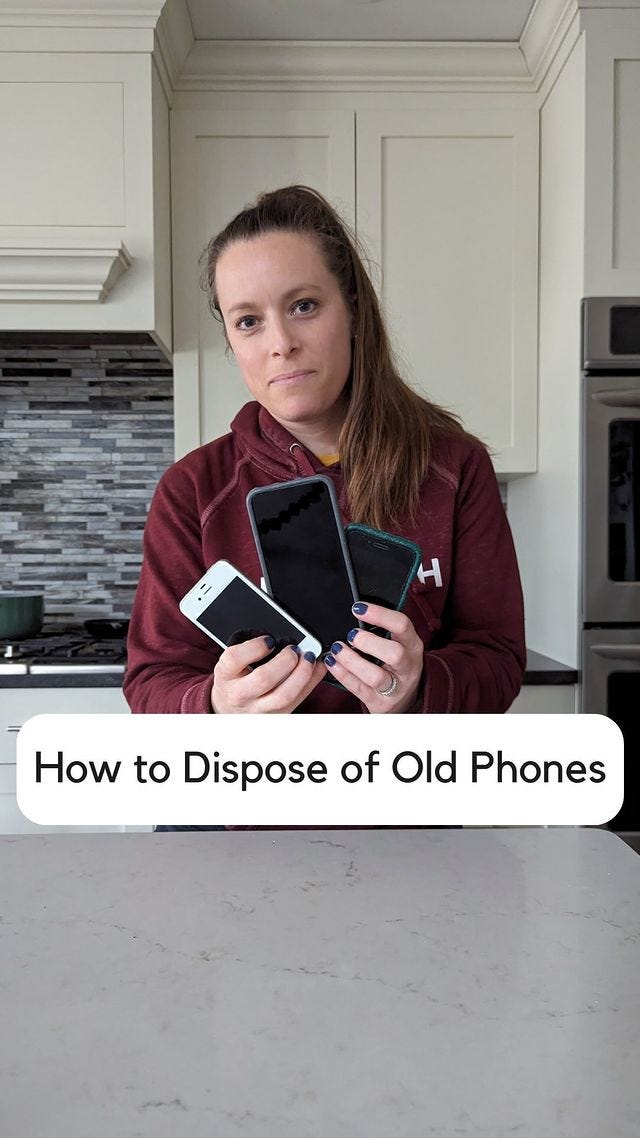issue #9: why can't we repair our stuff?
if it's broke, fix it... right?
Are you nice to neighbors? Do you ever help them fix stuff? Better question: are you allowed to help them fix their stuff? Now and Then? Now and Later? And the best subscription box for kids** (according to me, so that makes it very official).
today is…
national do something good for your neighbor day
Seems like a pretty good idea to me, especially since I’m often blabbing about being good stewards of our communities and making local spaces better for each other. This day feels pretty on brand.
You could do something simple for a neighbor like bake them cookies. Maybe you already volunteer at a community organization to foster stronger connections and support in your community. How about posting a few things you can pass along in your local Buy Nothing group that will be hot ticket items (that doesn’t necessarily mean expensive)?
Or maybe you’re ready to advocate for bike paths, sidewalks, parks, libraries, or other shared public spaces that can help us rebuild the sense of neighborliness we’ve lost to long commutes in cars and overpacked schedules of extracurricular activities. I bet you can find something worthwhile in your neck of the woods.
And no worries, it doesn’t have to be today. Any day is a good day to be a good neighbor.
sustainable spotlight
Not sure how to fix something? Despite some laws (which I delve into below) that make it way too hard to our stuff, iFixit is on a mission to help you repair your things anyway.
You can probably find some tutorials on YouTube that may or may not be useful. Just because random Joe Blo posted it on the internet doesn’t necessarily mean it’s great, though you can find good stuff there. But iFixit has your back (and the parts and tools).
I first heard about iFixit from their co-founder on this episode of How To Save a Planet. As the largest online repair community, they have all sorts of manuals, parts, and community members to help you fix just about anything. They cover electronic devices, cars and trucks, appliances, and more. They even have an entire section on fashion fixes so you don’t have to throw away your favorite jeans just because they have a tiny hole in them.
why don’t you fix it?
At the risk of dating myself, remember the good old days when we rode analog bikes without batteries or chargers? They had a bell and maybe even a banana seat, if your parents bought you the fancy one. The bike lasted years and was passed down to your siblings or friends.
I can’t hear the song “Sugar, Sugar” without thinking about watching the movie Now and Then with my sisters. Tell me this was a classic in your house too!
When the bike broke, a parent fixed it or brought it to the local bike repair shop. The tools, instructions, and skills to repair things were widely available, and many small businesses flourished repairing and serving our stuff to make it last. But alas, those days are but faded memories.
how things have changed
Markets have consolidated in recent decades. Large companies got larger and small companies got gobbled up or went out of business. (It’s that whole “trickle-down economics” thing not working out so well again…)💰Simultaneously, large companies sought new sources of revenue, often to feed infinite growth expectations from investors.
Sidebar: Can we briefly acknowledge that growth in perpetuity is impossible and a real zinger in the theory of economic health measured by exponential growth for the foreseeable future? It’s a short-sighted, narrow view of prosperity that is seriously messed up. Not to mention it’s the crux of our climate crisis, but that’s for another day. For now, read Doughnut Economics by Kate Raworth** if you want to dive in before I take it up here.
As digital trends accelerate, products incorporate more technology. While companies couldn’t prevent your dad from fixing your bike chain or crooked handlebars, they can create barriers in the technology of a product that lock out third-party service providers and their customers(!!) from being able to fix products after purchase.
I suspect the companies argue that increasingly complex technology can be further damaged or corrupted by people trying to fix it who don't understand the intimate details of it. But they could teach us, trust us, or waive warranties once we start tinkering with the tech. Problem solved. ✅
They also want to protect their intellectual property. But just because we can fix what we paid for doesn’t mean we can steal the technology or profit from copying it. That’s already illegal. Problem solved. ✅
it’s easier to make money without competitors
So what is it? In part, many companies make products today designed with planned obsolescence. They intentionally design products to break or become irrelevant after a period of time that supports their replacement sales cycle.
They also see premium, non-competitive revenue opportunities in servicing the products they make, especially when there are no or limited third parties to compete with them on price or availability of repair and maintenance services. Sounds like a good deal for the companies and a crummy deal for customers (because it is).
In short, many companies make products they know will break while waving customers out the door with a friendly smile saying, “I hope it doesn't break because you can't fix it. Thanks for being a valued customer.👍🏻” Good old unregulated capitalism and “free markets.”
does it matter?
This is annoying but manageable for more frivolous products that we can replace with some flexibility, like electronic devices, clothing, and washing machines. It’s wildly wasteful because so much stuff is thrown away instead of repaired. It costs customers more in the long run (which is precisely why it’s good for profits). But one could argue that it’s our choice to buy those products. (Technically true though hard to work around when we’re all running a race to the bottom, but sure.)
it sure does
It becomes a more serious issue for expensive machines with complex technology like cars, tractors, and medical equipment. Farmers, for example, can't fix their tractors during busy seasons like planting and harvesting because they’re at the mercy of the manufacturer's calendars and non-competitive pricing for repairs. The operational software lives behind secret codes that only company repair people know, so handy and resourceful farmers can't fix their equipment. Instead, they miss planting windows or crops rot in the field without machines to harvest them while they wait for corporate repair personnel to fit them into the schedule.
Not being able to fix things we already paid to own generates a lot of consumer waste, limits competition in the market, creates serious business obstacles for farmers and others who rely on their equipment to function, and further consolidates power at already large corporations. The Federal Trade Commission (FTC) agrees.
what’s the fix to fix this?
Companies could choose to be good partners to their customers, but that’s apparently a tall order these days. 🙄 There’s too much money at stake to balance the priorities of all stakeholders over the bottom line for big investors. This confluence of power plays is a perfect example of why capitalism (which doesn’t always suck) needs reasonable regulation to work well.
We need laws to protect competition, innovation, and reasonable access to repair and maintenance services. Right-to-repair laws are gaining traction, led by organizations like Repair.org.
According to the White House, “the right to repair is the right to fix something you own when it breaks—either by yourself or by taking it to an independent repair shop. By giving consumers more choices on where and how to get their devices fixed, right to repair lowers costs, makes it easier to fix the things you own, and increases competition.”
who’s gonna fix this?
Congress has no near-term plans to fix this (as far as I know). The House of Representatives introduced the Freedom to Repair Act in February 2022 and the Senate has its version, but they’ve made no meaningful progress yet.
Some of our friends in Congress are pretty busy accepting bribes in the form of gold bars and cold hard cash between calls to their brokers to trade stocks on non-public information they heard in Congressional committee meetings and elsewhere. We’ve seen increased bi-partisan interest in changing the rules to prevent this type of corruption🎉 but it has yet to become law. In the meantime, I imagine it’s hard to find time on their calendars to govern when they’re busy making bank.
Sidebar: Pantsuit Politics has an interesting take on corruption in politics and systematic circumstances that make the conversation about more than individual bad actors. Take a listen if you’d like.
the FTC, sort of…
The FTC has shown interest in shifting power back to consumers to fix their stuff without interference or approval from the original manufacturer. The Biden Administration deserves credit for this. It’s a good move for Americans, and voters should know that a presidential candidate pushes these priorities forward.
The FTC adopted a policy statement in July 2021:
“aimed at manufacturers’ practices that make it extremely difficult for purchasers to repair their products or shop around for other service providers to do it for them. By enforcing against restrictions that violate antitrust or consumer protection laws, the Commission is taking important steps to restore the right to repair.”
In short, the FTC views these repair limitations as anti-competitive, so they’re interested in making progress to fix it. FTC Chair Lina Khan, summed it up succinctly when she said “These types of restrictions can significantly raise costs for consumers, stifle innovation, close off business opportunity for independent repair shops, create unnecessary electronic waste, delay timely repairs, and undermine resiliency.”
The FTC is an independent agency of the United States. However, the five commissioners are nominated by the President, so the agency’s priorities can change with the whims of the current president. For now, they’re helping customers get access to fix what they’ve already paid for, one McDonald’s ice cream machine at a time.
state legislatures, where most of the real work gets done
While our friends in the US Congress are buying each other drinks at posh DC bars with their realized trading gains, many states have made progress on various forms of right-to-repair bills. Repair.org maintains an interactive map to help individuals understand the status of Fair Repair laws in their state and who to contact to advocate for them if they haven’t already been passed or warrant expansion to more categories of goods.
This is great for consumers! Customers can save money repairing instead of replacing products. Third-party repair services help make repairs less expensive by competing on price and quality. It just so happens that these circumstances are good for the environment too because it reduces waste. These laws keep more goods in the market longer before they end up in the trash.
Look at that! The darn mantra rears its head yet again. What's good for the planet is also good for us.
a few other eco things
I bet you didn’t know this about plastic.
Got green beans? If you’ve ever thought about growing just one veggie at home, consider green beans. They grow quickly, can flourish in a container, and don’t need a ton of heat or full sunlight. According to Sustainable Minimalists, green beans might have more pesticides than we think. I’m not suggesting you drop everything and grow all your own food (not my jam either). But one container of green beans might be a fun learning experience to better understand where food comes from and how much energy goes into getting all that goodness onto grocery store shelves.
just because
Want to know what I look like at home? Probably like this, with my nose in a book, and likely letting my kids do something a little bit risky.
Have you heard about new independence laws being passed to help parents give kids more freedom without getting in trouble?
If you have a friend or family member who doesn't believe in election integrity in the United States, consider sharing this podcast with them. Trump lost every single one of the more than 60+ election legal challenges he filed after the 2020 election with judges across the political spectrum, including some he appointed himself. Among other reasons, this confirms that the 2020 election was fair and square. Lack of confidence in our elections is a serious concern with violent consequences. If you know someone who still doubts that because the 'outrage machine media' continues to spout the Big Lie, the Pennsylvania Secretary of State shares in this podcast episode two topics worth understanding. 1) The people, science, and math behind our electoral process can give comfort in the integrity of vote counting and election security. 2) The bigger issue in current and upcoming elections as it relates to choosing candidates that reflect the will of the people is voter suppression, often via threats or misinformation and disinformation using AI. Know what to look for, because it’s coming…
Do your kids have this subscription box**? My younger son loves it! We just renewed for a second year.
weekly mini eco challenge
Today’s a twofer challenge. Try one (or do both!). It looks long but it’s quick and easy (I promise).
Step 1
Find out if you have a right to repair a bill in your state (if you live in the United States). You can do this on Repair.org with this interactive map. Some states have already passed some laws, but they all have room for improvement. None of them cover all types of equipment and devices.
Contact your state representative and let them know you support a bill; it might be broadening what already exists, passing what’s in progress, or using legislation from another state as model legislation for a new bill in your state. Using the Repair.org tool, you should be able to do this in less than ten minutes.
Fair repair bills are not particularly partisan. They’re good for market competition, small business creation, consumer advocates, and environmental purposes. A lot of people with different interests can get behind them.
If you run into strong opposition, ask who’s benefitting. There’s a good chance campaign donations from specific big businesses are bribing (I mean… influencing😉) those positions.
Step 2
With a grasp of the very basics of the legislation, start talking about it with friends to help advocacy of Fair Repair bills become more mainstream. You don’t have to shout from the rooftops about it. Mention it in passing when it comes up or is relevant.
Just a “Did you know some companies make it hard to fix our stuff? Have you heard of Fair Repair laws?” when someone mentions they have to replace their washing machine because it kicked after just a few years, they have to replace their entire phone because one small thing broke, or the ice cream machine at McDonald’s is forever out of order.
If they’re interested, share one of the many benefits of the legislation you think will resonate with them the most (less waste, more local small businesses, more innovation, healthy competition to keep prices lower, etc…).
We need more thoughtful and genuine conversations about things that matter, including politics, in our communities. Here’s a great place to practice that.
Until next time, I hope you’re having the best week available to you. Don’t hesitate to comment or leave questions. I love hearing from you all.
Jen
** These are affiliate links. They have no impact on your purchase. Thanks for supporting the newsletter!
💛 DID YOU KNOW that if you hit the HEART at the top or bottom of this newsletter, it makes it easier for people to find Stepping Stones (and totally makes my day)? TIA 💛
Jen Panaro is a self-proclaimed composting nerd and advocate for sustainable living for modern families. Through her writing, workshops, and podcast guesting, she helps others find ways to incorporate sustainability into their everyday lives more easily while appreciating the joy along the journey.
When she’s not writing and creating, she’s a serial library book borrower, a messy gardener, a composting tinkerer. She’s a wife and mom of two boys and spends a lot of time in hockey rinks and other sporting venues watching her boys tear it up for their teams.










